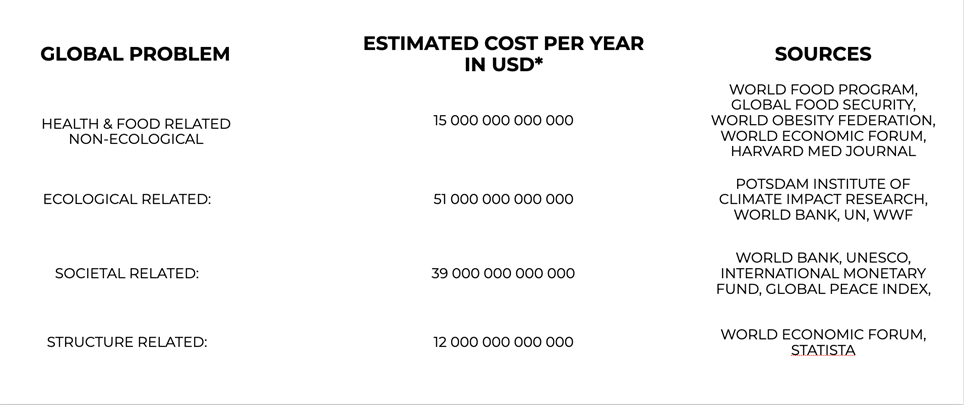In the mid-1950s, Albert Einstein and Bertrand Russell pleaded for a new way of thinking, focusing on how humanity deals with nuclear armaments. Today, the challenges we face are even more diverse, interconnected, and full of complexity. From the impacts of an exacerbated greenhouse effect, soil erosion, and water shortages to food insecurity, forced migration, political instability, violence, wars, and health crises like global obesity and air pollution, the scope of our problems is vast. Each year, the cumulative cost of our collective actions and inactions is measured in the tens of trillions of USD.

Note: The costs are not consolidated or adjusted for inflation. When a range is provided for the costs—such as with the impacts of the greenhouse effect—a lower estimate is selected to account for the non-consolidation of the data. Not all global issues are considered. The total yearly cost (estimated at 117 trillion USD) surpasses total global GDP production (104 trillion USD). Table compiled by author.
These costs are unlikely to subside or decelerate. Our choices—what we do and what we fail to do—fuel this economic burden of “biblical proportions.” What’s needed is a transformative shift in thinking, one that challenges the illusion of efficiency in our current system as highlighted by the sheer scale of human-induced economic costs.
The complexity of our reality surpasses naive models.
Sumantra Ghoshal offered a compelling analogy between classical physics and classical economics. If someone proposed an absurd theory on particle movement, would it alter how particles behave? Of course not. The laws governing the physical universe exist independently of human perception or belief.
But can we say the same for models developed in sciences that deal with human behavior? Hardly. Human-created systems are inherently tied to our beliefs, and these beliefs can directly influence outcomes. Consider the economic policies of the 1970s: Keynesian approaches in Germany had distinct results compared to the Chicago Boys’ policies forcefully applied in Chile. The difference is clear. Human-made systems—be they economic, political, or social—are choices we’ve crafted throughout history. The problem is that these systems are often naive in the face of reality’s complexity.
Perhaps the starkest example of this dissonance lies in how we view the relationship between economics, the environment, and society.

The waste we produce—most of which never appears on financial balance sheets—is not simply an externality. It’s a deferred cost, pushed onto others across space and time. This hidden burden, which will be explored in future articles in The Leipzig Glocal, adds up to trillions of USD in long-term costs, further eroding economic benefits for future generations. Unlike abstract particle physics, human ignorance of these hidden costs is no protection against their consequences. If we hope to secure long-term economic benefits—even from a coldly utilitarian perspective—the only rational choice is to reduce these hidden costs.
No environment and no societal stability means drastically reduced long-term economic benefits. Dispelling the myths surrounding this issue and fostering a greater literacy of complexity worldwide could catalyze meaningful change.
Consider the 1.2 billion people projected to be forcefully displaced, the 95% global soil erosion rate forecast, and the looming conflicts over water shortages. How will businesses operate under such conditions? How will democracies survive when high food prices alone have driven many to accept authoritarianism in so-called “beacons” of the free world? How will neoclassical economics and trade continue to function? The short answer is, they won’t. The result? Hundreds of trillions in economic costs.
Chopping the head off the Hydra
The following quote has been repeatedly attributed to Kurt Vonnegut (although its origin is unconfirmed):
We’ll go down in history as the first society that wouldn’t save itself because it wasn’t cost effective.
This critique points both to an illiteracy of complexity and to a misunderstanding of economics. When humans lose the ability to generate economic benefits due to hostile environments, authoritarian regimes, and resource shortages, it’s not just a social tragedy—it’s a financial disaster. Recognizing and mitigating these emerging costs could provide competitive advantages to forward-thinking corporations. The Leipzig Glocal’s publications will unpack this concept in detail.
To shift the status quo, individuals, organizations, and even nations must become aware that their current efforts are counterproductive to their own long-term interests. Corporations and NGOs alike risk getting stuck in a cycle of “chopping off the Hydra’s head,” celebrating small victories while the underlying problems persist. To achieve substantial change, we need a new base to stand on—one that fosters holistic solutions rather than piecemeal fixes.
Poisoning the Hydra: Bringing complexity literacy near you
The new way of thinking must embrace complexity across economics, management, and politics. It calls for a holistic approach that not only dissects the parts but also understands how they interconnect. This shift does not mean discarding our existing models. Instead, it means recognizing their limitations and building on them.

Our thinking must evolve from seeing human beings as constant, rational agents to understanding them as complex, dynamic entities. We must transition from believing the world is predictable to learning how to navigate uncertainty.
While big changes yield big results, small changes, if sustained, can produce monumental impacts over time.
Cause-and-effect models must give way to the reality of non-causal determinism. Mechanistic views of organizations should be replaced with insights drawn from living systems. And our understanding of mathematical rigor must expand beyond linear equations to include fractals and differential equations that have no single “solution” but exhibit sensitive dependence on initial conditions—allowing for only limited approximations of reality.
As mentioned, this new approach does not seek to overthrow existing models. Rather, it aims to reveal the limitations of the assumptions on which they are built. By doing so, we can generate novel outputs: metrics, methodologies, methods, tools, frameworks, processes, and systems to “poison the Hydra” and reduce today’s catastrophic costs. This work should be guided by the values inscribed in Leipzig’s Neues Rathaus: fortiter in re, suaviter in modo, constanter in se (“strong in substance, gentle in approach, constant in self”). Change should be pursued with strength of purpose, kindness towards people (not blaming individuals), and steadfast commitment.
As a former economics and management educator, I now dedicate my life to this cause. I seek all the support I can get—in any form—to spread complexity literacy as quickly as possible. Our greatest untapped resource is human collective creativity. Unlocking it could be the key to solving our most urgent global challenges.
By Dr. Javier Gomez Mata
The views of our contributing authors do not necessarily reflect the views of The Leipzig Glocal as a whole.





![Wine & Paint event on 9 Nov. 2024 at Felix Restaurant, Leipzig. Photo: Florian Reime (@reime.visuals] / Wine & Paint Leipzig](https://leipglo.com/wp-content/uploads/2024/12/pixelcut-export-e1733056018933.jpeg)



